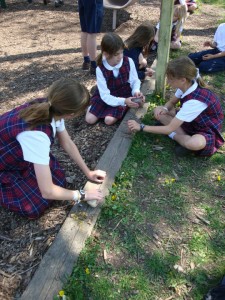By Julie Reynolds, Director of Curriculum
We were all meant to be naturalists, each in his degree, and it is inexcusable to live in a world so full of the marvels of plant and animal life and to care for none of these things.[1]
Did you know Clapham is training young naturalists?
Every class participates in Nature Study which includes both in-class study and nature walks. Each class has an emphasis, be it trees or wildflowers or birds or insects, and as they go on nature walks, they are encouraged to look and see, and to bring back what they have discovered. Once back they may sketch their findings or take more time to research the details of their discovery: species, name, parts, and so forth. They may observe, ask questions, or draw pictures, all of which gets them excited about nature in ways that most adults have long since abandoned. (Come on a nature walk and see for yourself!)
Nature Study encourages many good learning habits in our students, including attention, active participation, and natural curiosity. Have you ever studied an ant hill? It is amazing to see the relatively large pieces of wood and dirt these little ants carry so carefully. You may even see two ants working together to carry a larger wood chip.
In addition, like Picture Study, Nature Study is developing the habit of observation. In fact, the learning that takes place is really an added bonus triggered by the curiosity of observation. It is amazing what careful observation can teach.
Through Nature Study, children are also directing interaction with God’s creation and therefore learning about him. John Stott explains,
It was Jesus Christ himself in the Sermon on the Mount who told us to be bird watchers! ‘Behold the fowls of the air’ is how the King James’ Version renders his command (Matt 6:26). Translated into basic English, however, his instruction becomes ‘watch birds!’ So we have the highest possible authority for this activity. Moreover, he meant more than that we should notice them. For the Greek verb employed here means to fix the eyes on or take a good look at. This will certainly include our study and appreciation of their plumage and behavior. But the Bible tells us that birds have lessons to teach us as well. As a matter of fact, Scripture bids us go beyond birds and include in our interest everything God has made: ‘Great are the works of the Lord, studied by all who delight in them’ (Ps 111:2). Since ‘the works of the Lord’ refer to his works of both creation and redemption, it seems to me that nature study and Bible study should go together. Many Christians have a good doctrine of redemption, but need a better doctrine of creation.[2]
Nature Study at Clapham is one of the key parts of teaching a doctrine of creation. Martin Luther surmises from the same passage from the Sermon on the Mount: “You see, [Christ] is making the birds our schoolmasters and teachers.”[3]
At Clapham, we encourage students to be lifelong lovers of God and lifelong learners of the world he has made. With nature all around, there is never any reason for our children to claim to be bored. There are always wonders to be explored outside.
[1] Charlotte Mason, Home Education (London: Kegan Paul, Trench, Trubner, 1935; Wheaton, IL: Tyndale House, 1989), 61.
[2] John Stott, The Birds are our Teachers, p 10-11. Emphasis mine.
[3] Martin Luther, The Sermon on the Mount (1521).

